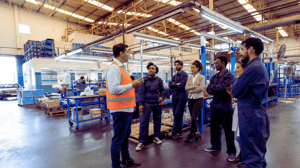If you work in manufacturing, you'll likely hear the term 'productivty' or variations of it on a daily basis. After reading Make UK's latest report 'Beyond Ambition: Advanced Manufacturing' it is evident why it should be a term everyone within a factory is familiar with and more importantly, working towards achieving greater productivity in the face of an ever-evolving global market.
Before we talk more about the key themes of the report, let us remind ourselves of the concept and origins of productivity.
The concept and origins of Productivity
The concept of productivity has evolved over centuries, but its modern understanding emerged during the Industrial Revolution in the late 18th and early 19th centuries. Before this period, productivity was not as systematically measured or managed as it is today. However, with the rise of industrialisation, especially with the introduction of machinery and the factory system, there was a greater emphasis on efficiency and output per unit of input.
One of the earliest known measures of productivity is often credited to the Scottish philosopher and economist Adam Smith in his seminal work "The Wealth of Nations," published in 1776. Smith discussed the concept of division of labour and how it could lead to increased productivity in manufacturing processes.
Since then, the concept of productivity has continued to evolve, incorporating various measures and methodologies for assessing and improving efficiency in different contexts, including agriculture, manufacturing, services, and knowledge work. Today, productivity is a central concern for businesses, governments, and individuals alike, driving efforts to optimise processes, utilise resources efficiently, and enhance economic growth.
At FourJaw, it is our vision to maximise manufacturing productivity across the globe so we fully support the statistics, real-world examples, concepts and recommendations the report covers.
Make UK’s report - Beyond Ambition: Advanced Manufacturing key takeaways
- True industrial advantage lies not solely in what we make, but in how we make it.
- By focusing not just on what they make, but how they make it, firms can achieve dramatic productivity gains, boost environmental sustainability, and increase their balance-sheet profitability – to not only survive but thrive in the face of a rapidly evolving global market.
- By embracing advanced manufacturing as not just product-oriented invention, but a focus on process-driven innovation, firms are unlocking dramatic productivity gains, boosting environmental sustainability, and increasing their balance-sheet profitability
- Productivity growth, that is producing more output with the same amount of input to increase company profitability, essentially comes from a combination of two factors: process innovation, and product innovation.
- The UK has a productivity problem. In the 15 years before the global financial crisis of 2008 the UK economy grew by about 50%. In the 15 years following the global financial crisis, it grew by only around 20%.
- The cost of almost two lost decades has been huge. Had the UK’s productivity growth rate not fallen after the global financial crisis, GDP today would be £10,700 higher per person than it is. Put simply, the UK is getting poorer in the absence of productivity growth. Raising productivity is ultimately the only route to higher growth.
- There would be major benefits to the wider UK economy if businesses closed the productivity gap. Make UK analysis shows that if the manufacturing sector's direct contribution increased from 10% to 15% of the current UK GDP it would add over £142bn to the economy.
- The UK manufacturing sector is the 8th largest in the world. Yet ranks only 24th globally for robotic density, averaging 111 robots per 10,000 employees. This level is well below the world average.
As a company, we are seeing the increasing speed at which manufacturers (of all sizes) are recognising 'smart technologies' as an important tool to have if they are to remain competitive in the global race for productivity growth.
We see first-hand how manufacturers can unlock greater operational efficiency and resilience and ultimately increase their potential to innovate, create, and grow when they use technology to automate and help them measure their productivity.
"Productivity is not everything, but in the long run, it's almost everything."
Paul Krugman, The Age of Diminished Expectations, (Cambridge MA, 1990).
Visit Make UK to read the full unabridged version of the report.
Start your Factory Digitisation Journey with FourJaw
Book a call with one of our manufacturing technology experts and find out how FourJaw can support your factory and its people on its journey to embracing digital technologies.



